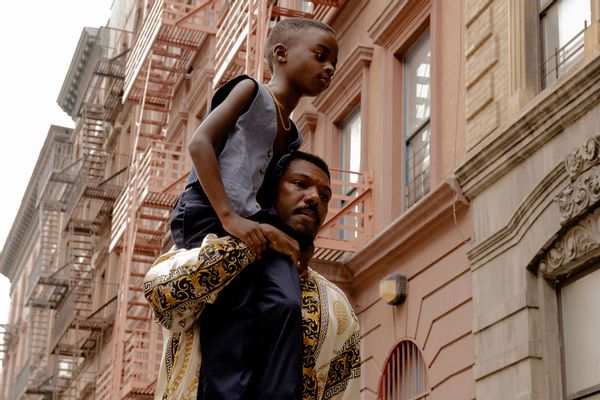The trailer to "A Thousand and One" will lead you to believe that the film is about a mother fighting to hold on to her son. That is partially true, but the actual project is about so much more.
At the film's beginning, we meet Inez, brilliantly portrayed by Teyana Taylor. She's a hairdresser finishing a prison stint at Rikers Island for boosting and newly released back into her Brooklyn community with a hunger to reestablish herself as a beautician and stay on the right track. Her plans derail when she bumps into her 6-year-old son Terry as he wanders the street. (Terry is played at ages 6, 13 and 17 by actors Aaron Kingsley Adetola, Aven Courtney, and Josiah Cross.)
"A Thousand and One" is not a drug-slanging, shoot-'em-up bang-bang tale. It's about love, sacrifice and then more love.
Terry is in foster care, and we quickly learn that Inez grew up in the same system – which means she knows about the abuse, the pain and how many foster parents are only in it for the monthly check. Inez, who has missed parts of Terry's life from time to time because of her troubles with the law, promises to never leave him again. Terry is initially reluctant but gains confidence as his mom appears to be keeping her word. The dynamic of their relationship changes when Terry falls out of a window, busts his head and is admitted to the hospital. This is where we will see the two slightly estranged relatives connect.
Inez visits her son daily, and we notice that the foster parents, the ones who were responsible for him sustaining the injury, never show up. Terry, who's semi-standoffish at first, fully opens up to his mom, saying he wants to stay with her forever. Inez has made so many mistakes in her life, and abandoning her son when he needed her the most wasn't going to be one of them. Viewers who don't have any understanding of Inez's reality get a rare chance to connect with her at this moment as she only has two options: send her son back to the neglectful, abusive household that allowed him to bust his head wide open while spending a decade trying to get him back by following the legal route or grab your child and escape because the consequence of leaving him in foster care is death. Inez chooses the latter, which can easily land her back in the big house.
With a fake Social Security card and birth certificate, Inez moves to Harlem and builds a new life with her son. As she settles into her new life in Harlem, viewers watch their family grow; Terry ages, and Inez reunites with and marries an old love named Lucky, played by William Catlett. Lucky is not Terry's father; however, he serves as the young man's only father figure, a reality that remains present in many poor and oppressed communities. Lucky had no plans on raising a son with Inez upon their reunion, but we do what we have to do.
 Aaron Kingsley Adetola stars as six-year-old "Terry" and Will Catlett stars as "Lucky" in writer/director A.V. Rockwell's "A Thousand And One" (Courtesy of Aaron Ricketts/Focus Features)
Aaron Kingsley Adetola stars as six-year-old "Terry" and Will Catlett stars as "Lucky" in writer/director A.V. Rockwell's "A Thousand And One" (Courtesy of Aaron Ricketts/Focus Features)
The system is incredibly broken, and filmmaker A.V. Rockwell does an excellent job exposing its holes directly and indirectly.
The happiness displayed amongst the three is a thing of beauty that is too often skipped over in films dealing with poverty. "A Thousand and One" is not a drug-slanging, shoot-'em-up bang-bang tale. It's about love, sacrifice and then more love. Sacrifice is the critical ingredient in survival for those of us who grew up Black and poor, and this film knocks that fact out of the park, so well that the act of sacrifice becomes kind of a character. Every player in the film specializes in sacrifice.
Viewers with a more privileged life experience may need clarification on law enforcement's inability to track down Terry but need not. The system is incredibly broken, and filmmaker A.V. Rockwell does an excellent job exposing its holes directly and indirectly. The direct version of our flawed system comes through in the way Inez lives as a young woman who was a product of the system and reenters society with little to no opportunity in a world where everything costs, which is the primary reason most people end up back in prison. Inez is also the victim of gentrification and a rip-off landlord who purposely destroyed her home so that he can move her out, renovate and hopefully bring in another tenant that can afford to pay more for the unit.
The indirect part is defined through policy. When we meet Inez, Rudy Giuliani begins his tenure as mayor. Giuliani, who would go on to be known nationally because of his racism, was the architect for the law-and-order race-based stop-and-frisk policies that would lead to a young Terry being constantly harassed, which would not only have an impact on him and Lucky but Inez as well. Who wants to see their children constantly harassed? Things don't change under Mayor Bloomberg, who promises a different New York but fails to protect citizens like Inez from policies that aid predatory gentrifiers, similar to the guy who took over her apartment. Giuliani and Bloomberg unite when considering the flaws inside the foster care system throughout the film. The two mayors fail Terry, as the system failed Inez.
Want a daily wrap-up of all the news and commentary Salon has to offer? Subscribe to our morning newsletter, Crash Course.
The biggest flaw in the foster care system is that it is extremely easy for a parent like Inez to lose custody of her son; however, it is extremely hard for children to be stripped away from foster parents, even if they allow babies to fall out of windows. Cocktail that with the idea their foster parents get aid and support to take care of children on top of a stipend, while biological parents don't get the same help. Multiple administrations have been familiar with this reality, yet nothing has changed.
Inez does her best to raise Terry, finds out he is brilliant and forces him into a competitive high school. Terry excels and now has the option of choosing from the top colleges in the country. While looking for a job to scrape up some extra cash as he ponders schools, his fake documents are exposed, throwing their family into a whirlwind. To makes matters worse, all of this happens while Lucky slowly dies from cancer.
The biggest payoff in "A Thousand and One" is that Inez isn't Terry's biological mother. Terry was a child born into foster care, and Inez knows it's so messed up that she sacrifices her life to give him better.
"A Thousand and One" is currently in theaters.
Read more
about this topic



Shares